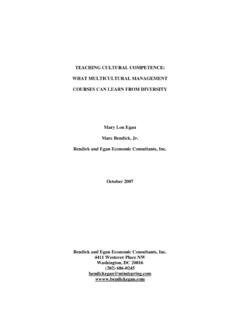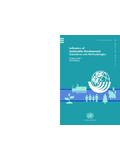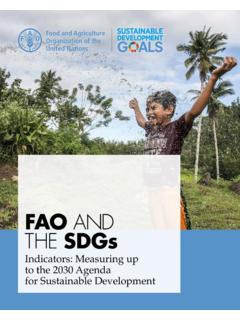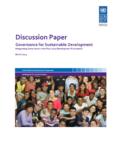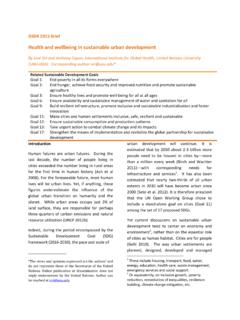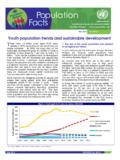Transcription of Syllabus: Sustainable Development
1 Syllabus for Introduction to Sustainable Development ESCEM-Poitiers January 2004. Mary Lou Egan Marie Le Borgne-Lariviere Janis Hilaricus Fabrice Mauleon Dominique Wolff Objective The objective of the introduction, beyond providing a basic introduction to Sustainable Development concepts, is to recognize the challenges of Sustainable Development ; the opportunities and limits for the private sector in meeting these challenges; and prepare you for the application of these concepts in functional business topics. The introduction is organized around two themes: What is Sustainable Development , where does it come from, and why it has moved from a marginal to central position in today's world.
2 What are the roles and techniques used by the private sector (firms) and public sector (governments, international organizations, etc.) to further Sustainable Development efforts in the developed and developing worlds? Course Materials In the spirit of sustainability, class lecture slides (found on ). and readings are available on the web to support in class lectures. For guidance to additional sources, please notice the link to various bibliographies at the end of the syllabus. Grading There will be two brief written quizzes in class that will be included in the 60% of the course total grade.
3 Class Sessions Session 1: Social Responsibility, Firms and Sustainable Development Learning objectives: Able to answer the following questions: What are the definitions of the basic concepts of sustainability? What are the landmark events that have contributed to today's notion of sustainability? How does Sustainable Development affect your likely career path in management? Part 1. Introduction to course Part 2. What is sustainability? Additional information: For definitions and criteria Read Chapter 2, Managing a Broader Portfolio of Assets (pp.)
4 13 35), in World Bank Development Report 2003. On line Read pages 1-13 in Panayotou's Globalization and Environment. This site gives you access to the full paper in pdf. Read The Challenge of Sustainability, Global Environment Facility. Washington, : World Bank, 2002. Session 2: Is it possible to combine sustainability and business success? Learning objectives: Able to answer the following questions: Why do firms adopt a Sustainable strategy? What tools do firms use to implement their SD strategies? How do stakeholders evaluate a firm's commitment to Sustainable strategies?
5 Part 1. Quiz Lecture Part 2. Case studies and presentations Additional information: Porter, Michael. 2002. Preface. In Tomorrow's Markets, Global Trends and their Implications for Business. On line Michael Porter and Claas van der Linde. Green and Competitive: Ending the Statlemate. Harvard Business Review, Sept-Oct., 1995: 120-134. PricewaterhouseCoopers LLP 2002 Sustainability Survey Report executive summary and key findings (pp. 1-3 and 6-12) On line MacLean, Dick. Making the Move from Spin to Strategy. AHC Group.
6 On line Read pp. 30- 41in Panayotou's section Globalization and Environment . Note: In-class information on business strategies ( tools and cases) is based on materials from Business and Sustainable Development : A Global Guide, found at: ; and The Sustainable Development Journey, found at: Make Session 3: Firm Level: Environmental Management Systems: Using Standards, Certification and other Systems to further SD goals Learning objectives: Able to answer the following questions: What global management systems exist to guide firms in establishing and implementing a strategy?
7 How do these various approaches, including certification, encourage Sustainable business practices? Part 1. Environmental Management Systems ISO 14001. EMAS. Presentation of case studies: Do firms benefit from adopting practices such as ISO? Part 2. The Social Side of SD. SA8000. Cases Film Additional information: World Development Report 2003. Chapter 3, Institutions for Sustainable Development . On line Standards and systems, read Read and understand the definitions of empowerment And social capital Case studies on ISO 14000 from 14000/ Class 4: The Boundaries of Sustainable Development Learning objectives: Able to answer the following questions: 1.
8 How do stakeholders cause policies and boundaries -- to change? 2. What role do reporting systems play in this process? 3. What has the NRE offered that other reporting systems have not? 4. What does the law (national & international) cover and not cover in this process of defining boundaries? Quiz Part 1: Institutions/stakeholders & SD. A. Markets, NGOs, & Governments B. Transparency & Reporting Systems Part 2: International A. Evolution of SD law B. International trade: GM Food Contest Additional information: SustainAbility.
9 2003. The 21st Century NGO. M. Egan, D. Wolff, F. Mauleon and M. Bendick. 2003. The NRE, Presentation to APPAM Conference, Washington, DC. References Austin, James and Tomas Kohn. 1990. Strategic Management in Developing Countries. The Free Press. Berger. 1994. The Environment and the Economy. In Smelser and Swedberg (eds.). The Handbook of Economic Sociology. Russel Sage Foundation. D'Arcy, David. Transcript of broadcast, Dec. 5, 2002, In Houston, a Treasure of Exiled Afghan Art, National Public Radio, found at Egan, Mary Lou and Marc Bendick, Jr.
10 Workforce Diversity Initiatives of US MNCs in Europe. Thunderbird International Business Review, Forthcoming December 2003. Elkington, John. Cannibals with Forks: The Triple Bottom Line for 21st Century Business Oxford: Capstone Publishing, October 1997. Guillen, Mauro and Sandra L. Suarez. 2002. The Institutional Context of Multinational Activity. In Organization Theory and the Multinational Corporation. 2nd edition. New York: St. Martin's Press. Hecht, Alan D. 1999. The Triad of Sustainable Development : Promoting Sustainable Development in Developing Countries.
